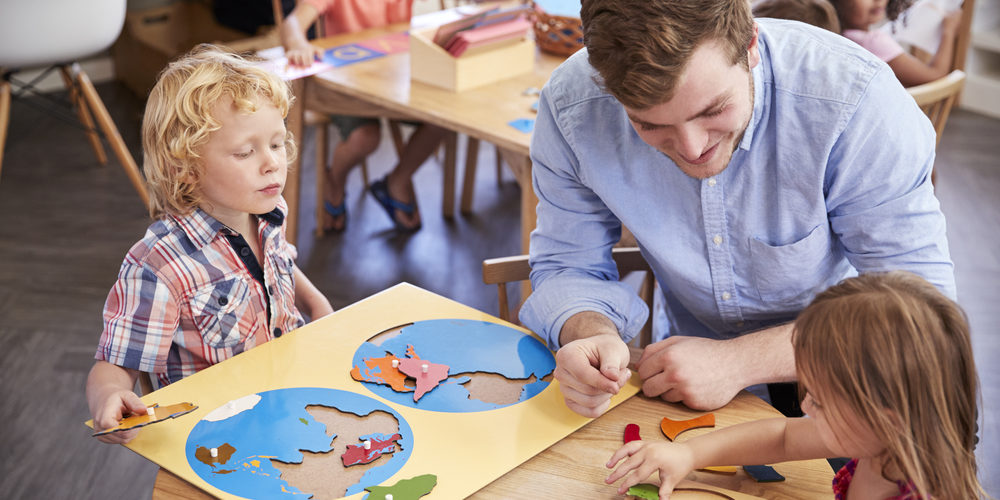Choosing a Montessori school for your child is beneficial in many ways. Not only is the environment ideal for supporting students individually, it also allows for community-building, and leads to lifelong learners. Montessori students are able to freely engage in materials and concentrate deeply on the task at hand, which opens their minds to possibilities. How does this happen? Here are 3 ways Montessori school helps children explore their passions:
1. Emphasis on Independence and Motivation
The lessons a child learns in the Montessori classroom do not disappear the moment they graduate. A precept of Montessori is that lifelong learning is essential, and so the classroom, materials, and curriculum are lovingly crafted to give every student a chance to pursue their passions. The prepared environment, for example, provides students with opportunities to interact with all kinds of objects, materials, and textures. There are a broad range of books and tasks that can be used to occupy their time.
This is because learning happens everywhere. Children who attend Montessori schools become lifelong learners for that reason.
The Montessori curriculum includes more than academics. While mathematics, reading, and writing are extremely important from the beginning, there are other skills children pick up at their Montessori school. For example, young children will learn the importance of organization and neatness. As they age, they start using the utensils in the classroom to make healthy snacks for their classmates and themselves.
Children are also given ample time outside, when the weather permits. No facet of the world is ignored by Montessori, so the students can always find something to work on and be inspired by.
2. Self-Directed Lessons
From a young age, children desire to learn about the world. They do not need coaxing to go out and explore. They also do not need to be forced to learn. However, traditional schools tend to force students to learn about things they are not interested in or provide little time for deep diving into subject matter.
In the Montessori classroom, learning happens naturally. Lessons are self-directed, giving students the chance to explore the information or ideas on their own time and with their preferred medium. What self-directed learning does not mean is absolute freedom or a disregard to structure. The classroom is intentionally crafted with routines and materials and lessons that teach the child self-regulation.
For example, if a child happens to have a passion for art or history, they can use that passion to help learn about geography and culture. If they have a passion for dinosaurs, they might learn mathematics by counting dinosaur figurines or study biology by researching dinosaur anatomy. This way, the child stays engaged, because they are following their passions and simultaneously learning multiple subjects.
How Uninterrupted Concentration Aids Passion
One of the elements of self-directed lessons is uninterrupted work time. Built into the daily schedule of Montessori programs, including those at Fishtown Montessori, are 3 hour blocks of work. Maria Montessori, the founder of Montessori education, found that students learn best when they can remain absorbed in their work. During this time, the student can recognize their mistakes, assess new avenues to arrive at a similar result, and also explore their passions while engaged with a task.
Although there is no set lesson that everyone must work on like a traditional school, it does not mean that Montessori students aren’t learning. In fact, because they can concentrate for longer periods of time, the benefit of the lesson is much greater. Getting rushed into a new activity when they don’t fully understand what they were working on previously only hinders their growth.
That is why you will rarely see Montessori teachers interrupting the students once they get to work. Instead, the teachers observe to see each child’s progress.
3. Individualized Learning Plans
Each child is seen as a unique person in Montessori. The Montessori philosophy recognizes that children are all different and have different passions and learning styles. Therefore, Montessori teachers work hard to accommodate these various learning styles. They carefully watch the children and observe their strengths, weaknesses, and passions to curate lessons that help them grow.
While self-assessment and self-correction are key to Montessori, the teachers and other students support one another. The multi-age classroom (with a 3-year age range) is set up to become a family, where there are role models and mentors to lend a hand when necessary. Alongside the individualized learning plans, the ability to socialize and work together also teaches children to respect one another and their uniqueness.
Passion Makes a Difference in Education
Do you want to see your child head off to school each day with a smile on their face? When children do what they love, they become motivated, confident, and independent individuals. Enrolling your child in a Montessori school like Fishtown Montessori in Philadelphia ensures that they will become a lifelong learner with curiosity and ambition.
At Fishtown Montessori, we recognize the importance of passion and provide our students with a stunning classroom and the tools needed to explore. See what makes us different. Give us a call or schedule your tour of our school today! We look forward to meeting you.






